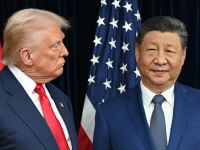Nigeria's most senior judge has criticized justices who grant injunctions blocking corruption trials, saying they are harming the judicial process, the newspaper The Guardian reported on Tuesday.
Mohammed Uwais, Nigeria's chief justice, told a gathering of judges in Abuja on Monday that suspicion was growing nationwide that judges were defending those guilty of corruption.
"The judiciary has for some time now been concerned about its public image," Uwais said.
"The slightest suspicion of corruption of a judge tarnishes the reputation of other judicial officers and brings the entire institution into disrepute," he went on.
"The incessant indiscreet granting of ex-parte applications ... to stop events or authorities from carrying out their legitimate functions ... has been a source of embarrassment for us and the national judicial council," the country's most senior judge declared.
"A reasonable person may conclude that the judge had some ulterior... motive to serve," he added.
President Olusegun Obasanjo last year set up an anti-corruption commission, led by a senior retired judge, Mustapha Akanbi, charged with prosecuting reported corruption cases.
In May, the commission opened its first case, putting on trial four officials and businessmen accused of corruption.
But the case has been repeatedly stalled by a series of rulings in different Nigerian courts ordering a halt to - or delay in - the proceedings.
In a statement read out at the judges gathering on Monday, Obasanjo complained at the way the commission was being treated.
"It is obviously disturbing to discover that the onerous duty of the Justice Akanbi-led panel is being unnecessarily hampered by litigation instituted by suspects who should ordinarily be behind bars for committing horrendous economic crimes," he said.
Besides corruption trials, investigations of corruption in parliament have also been put on hold by court rulings, as have the trials of officials and senior figures from the regime of the former military ruler, the late General Sani Abacha.
And attempts by an important human rights panel to call three former military rulers to appear before it were also blocked by a court.
Uwais, meanwhile, criticized the government, saying that some ministers had ignored rules meant to guard the independence of the judiciary when setting up tribunals.
"Since the inception of the current democracy, the federal judiciary as well as two or so state judiciaries have experienced the appointment of judges at the instances of ministers to chair tribunals without due consultation with their head of their courts," he said.
"This is clearly a violation of the principle of separation of powers between the three arms of government as laid down in the constitution." -- AFP
© 2001 Al Bawaba (www.albawaba.com)







